- Mountain Empire Community College is a two-year college serving residents of Lee, Scott, Wise, and Dickenson counties, as well as the City of Norton. The College, one of twenty-three in the Virginia Community College System, operates under policies established by the State Board for Community Colleges and the Local Advisory Board. The College is financed primarily with state funds supplemented by contributions from the participating localities.
School Highlights
Mountain Empire Community College serves 2,631 students (37% of students are full-time).
The college's student:teacher ratio of 15:1 is lower than the state community college average of 23:1.
Minority enrollment is 8% of the student body (majority Black and Hispanic), which is more than the state average of 53%.
Quick Stats (2025)
- Enrollment: 2,631 students
- In-state tuition: $3,336
- Out-state tuition: $8,006
- Student:teacher ratio: 15:1
- Minority enrollment: 8%
- Source: Integrated Postsecondary Education Data System (IPEDS)
Top Rankings
Mountain Empire Community College ranks among the top 20% of public schools in Virginia for:
Category
Attribute
Affordability
School Resources
School Overview
The teacher population of 172 teachers has stayed relatively flat over five years.
Mountain Empire Community College
(VA) Community College Avg.
Carnegie Classification
Associate's Colleges: Mixed Transfer/Career & Technical-High Nontraditional
Associate's--Private For-profit
Institution Level
At least 2 but less than 4 years
At least 2 but less than 4 years
Institution Control
Public
Private, non-profit
Total Faculty
172 staff
129 staff
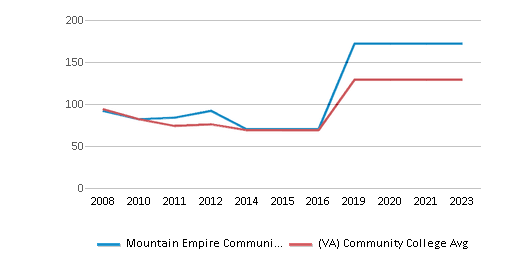
School Calendar
Student Body
The student population of Mountain Empire Community College has grown by 13% over five years.
The student:teacher ratio of 15:1 has increased from 13:1 over five years.
The Mountain Empire Community College diversity score of 0.15 is less than the state average of 0.71. The school's diversity has grown by 29% over five years.
Total Enrollment
2,631 students
1,350 students
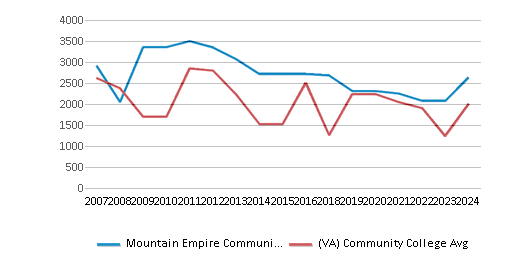
Student : Teacher Ratio
15:1
23:1
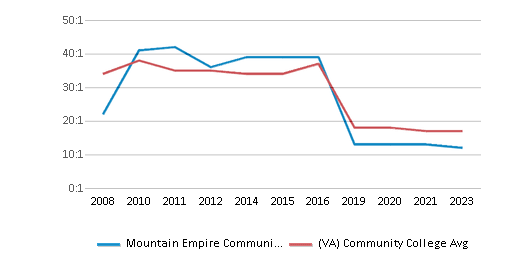
# Full-Time Students
975 students
637 students
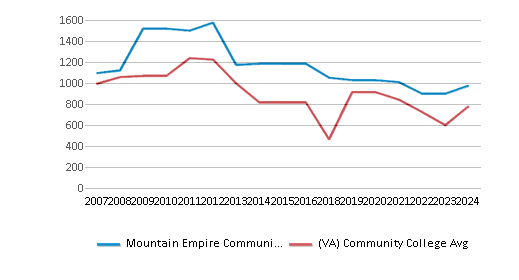
# Part-Time Students
1,656 students
971 students
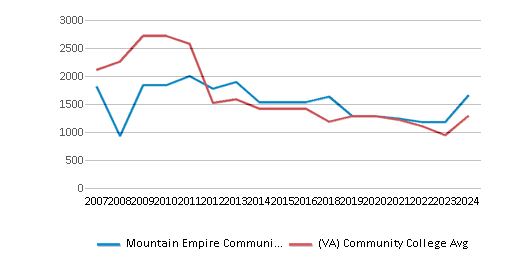
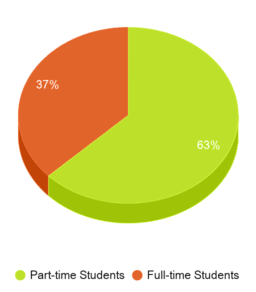
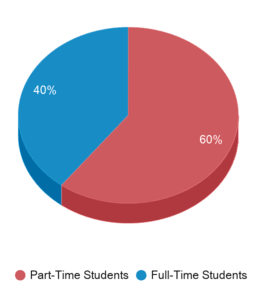
# Enrollment Undergraduate
263 students
314 students
# Full-Time Undergraduate Students
975 students
611 students
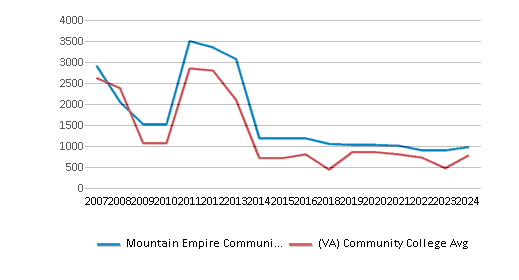
# Full-Time Graduate Students
n/a
158 students
# Part-Time Undergraduate Students
1,656 students
971 students
# Part-Time Graduate Students
n/a
61 students
Total Dormitory Capacity
n/a
476 students
% American Indian/Alaskan
n/a
n/a
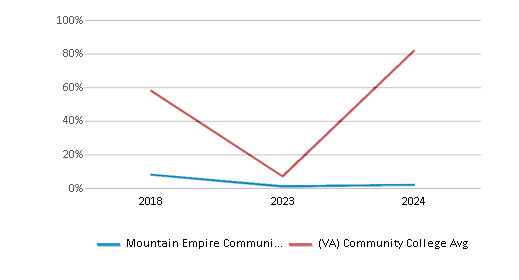
% Asian
1%
8%
% Hispanic
2%
13%
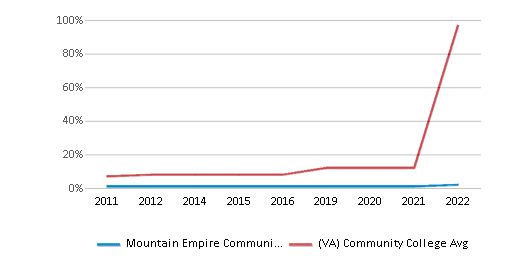
% Black
2%
21%
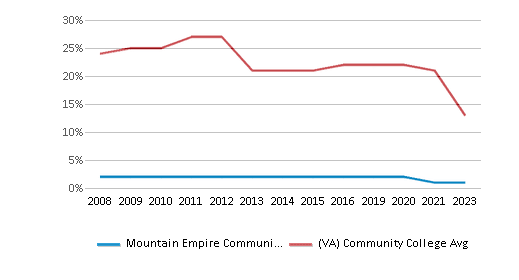
% White
92%
47%
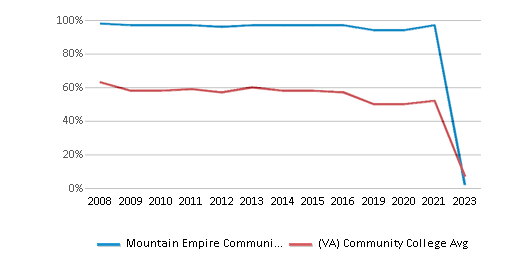
% Hawaiian
n/a
n/a

% Two or more races
2%
5%
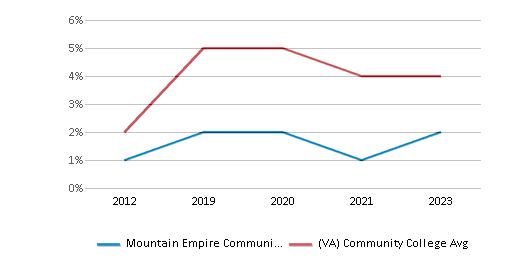
% Non Resident races
n/a
2%
% Unknown races
1%
4%
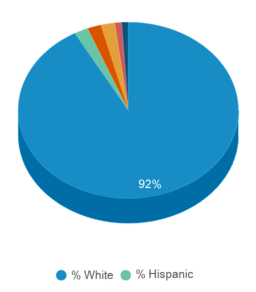
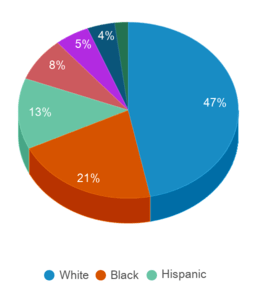
Diversity Score
0.15
0.71
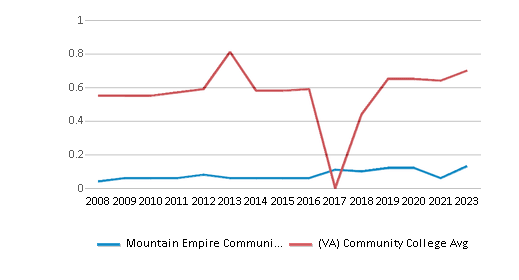
College Completion Rate (Students who graduate in less than 4 years)
0.4046%
0.4094%
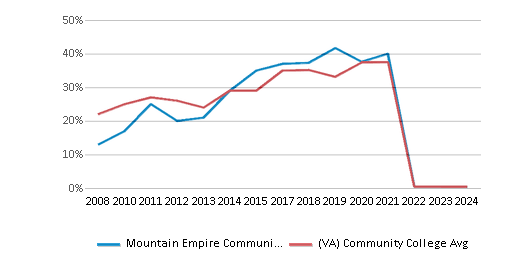
College Completion Rate (Students who graduate in 4 years or more than 4 years)
n/a
0.264%
Average Graduate Earnings (10 Years)
$27,300
$29,600
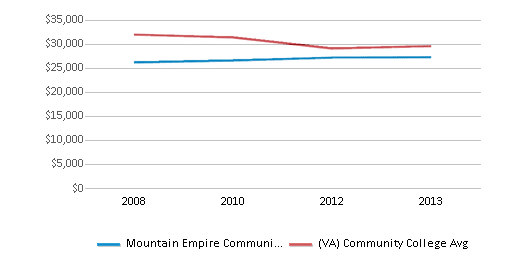
Tuition and Acceptance Rate
The public in-state tuition of $3,336 is less than the state average of $3,748. The in-state tuition has declined by 29% over four years.
The public out-state tuition of $8,006 is less than the state average of $8,977. The out-state tuition has declined by 25% over four years.
In-State Tuition Fees
$3,336
$3,748
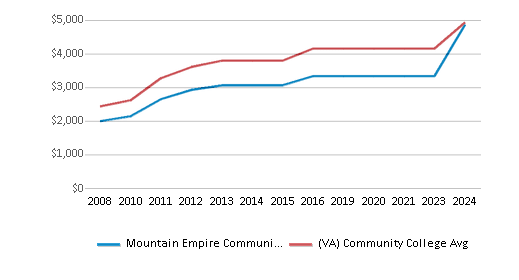
Out-State Tuition Fees
$8,006
$8,977
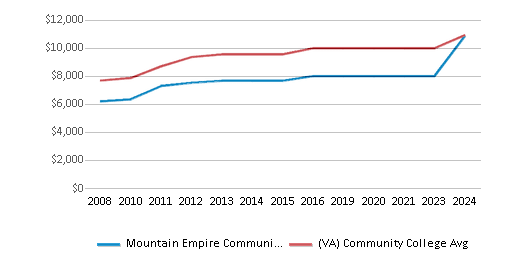
% Students Receiving Some Financial Aid
99%
78%
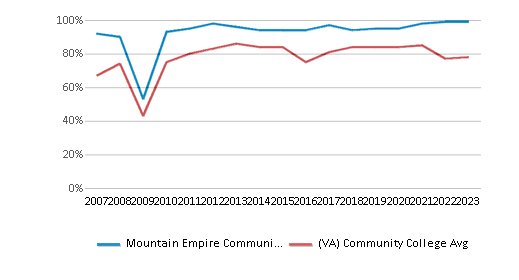
Median Debt for Graduates
n/a
$10,500
Median Debt for Dropouts
n/a
$5,500
Acceptance Rate
n/a
59%
Source: 2024 (or latest year available) Integrated Postsecondary Education Data System (IPEDS)
School Notes
- In 1966, the Virginia Assembly enacted historic legislation establishing a statewide system of comprehensive community colleges. This legislation brought most post high school education below the bachelor's level into one system, and broadened the base of higher education in the state to such an extent that Virginia, for the first time in the twentieth century, took a major step toward democratizing higher education. As comprehensive institutions, the community colleges endeavor to serve all segments of society. In August 1971, Dr. George B. Vaughan was named president of Mountain Empire community College and groundbreaking ceremonies were held in October of that same year. The first classes were offered in the fall of 1972. The college provides a comprehensive program of student development services. The college offers occupational-technical education, transfer education, developmental studies, general education, continuing and distance education, workforce development, and community services. Mountain Empire Community College is located on 95 wooded acres. The college buildings includes Holton Hall, Godwin Hall, industrial technology building, Dalton-Cantrell Hall and Robb Hall. Mountain Empire Community College is accredited by the Commission on Colleges of the Southern Association of Colleges and Schools to award the associate degree.
Frequently Asked Questions
How much does Mountain Empire Community College cost?
Mountain Empire Community College's tuition is approximately $3,336 for In-State students and $8,006 for Out-State students.
What is Mountain Empire Community College's ranking?
Mountain Empire Community College ranks among the top 20% of community college in Virginia for: Least expensive tuition and Percent of students receiving financial aid.
Recent Articles

Obtaining Your Bachelor's Degree at a Community College
Explore the evolving landscape of community colleges offering bachelor's degrees, addressing affordability, accessibility, and workforce needs.

A to Z of Community College Certificates and Courses
From business and healthcare to technology and skilled trades, the article showcases the breadth of options available to students seeking to enhance their knowledge, develop new skills, or pursue career advancement.

What is a Community College?
This comprehensive guide explains what a community college is, its history, and its role in higher education. It covers the types of programs offered, differences from four-year colleges, benefits of attending, and important considerations for prospective students, providing valuable insights for those exploring educational options.









